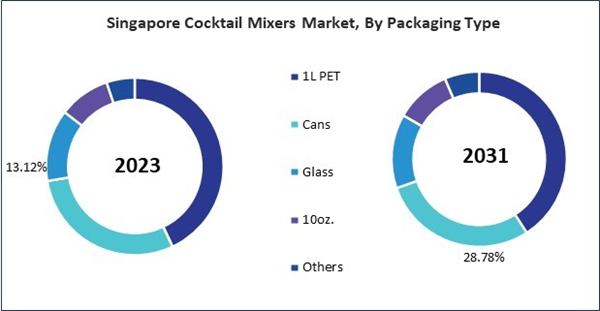The China market dominated the Asia Pacific Cocktail Mixers Market by Country in 2023, and would continue to be a dominant market till 2031; thereby, achieving a market value of $1,408.6 million by 2031. The Japan market is registering a CAGR of 7.7% during (2024 - 2031). Additionally, The India market would showcase a CAGR of 9% during (2024 - 2031).
Bars and clubs have also been pivotal in driving the demand for innovative cocktail mixers. The rise of craft cocktail bars, particularly, has transformed the beverage landscape. Bars like Death & Co in New York City have set the standard for cocktail excellence by using high-quality mixers and ingredients to craft unique and inventive drinks. These establishments often create house-made mixers, such as custom syrups and bitters, to ensure the highest quality and distinct flavor profiles. This dedication to craftsmanship attracts cocktail enthusiasts and connoisseurs, fostering a loyal customer base and driving market growth.
Sustainability and ethical production practices are gaining ground in popularity. Consumers seek mixers made with responsibly sourced ingredients, minimal environmental impact, and ethical labor practices. Brands that prioritize sustainability, such as using recyclable packaging and reducing carbon footprints, are gaining favor with eco-conscious consumers. The trend towards transparency and corporate social responsibility drives brands to adopt sustainable practices and communicate these efforts to their customers.
Japan's National Tax Agency expressed concern that younger consumers of legal drinking age were consuming less alcohol compared to previous generations, leading to a decline in tax revenues. In response, they initiated a national competition named 'Sake Viva!' aimed at individuals aged 20 to 39. The competition solicited ideas to stimulate demand for alcoholic beverages, including beer, sake, wine, and whisky. Thus, the increasing alcoholic beverage consumption in the region will support the expansion of the market.
Based on Distribution Channel, the market is segmented into On-trade, and Off-trade. Based on Product, the market is segmented into Tonic Water, Club Soda, Ginger Ale, Ginger Beer, and Others. Based on Packaging Type, the market is segmented into 1L PET, Cans, Glass, 10oz., and Others. Based on countries, the market is segmented into China, Japan, India, South Korea, Singapore, Malaysia, and Rest of Asia Pacific.
List of Key Companies Profiled
- Fever-Tree Drinks PLC
- The Coca Cola Company
- Keurig Dr Pepper, Inc.
- Britvic PLC
- Fentimans Ltd.
- White Rock Products Corporation
- Zevia, LLC
- Thomas Henry GmbH
- East Imperial Beverages Corporation
- PepsiCo, Inc.
Market Report Segmentation
By Distribution Channel- On-trade
- Off-trade
- Tonic Water
- Club Soda
- Ginger Ale
- Ginger Beer
- Others
- 1L PET
- Cans
- Glass
- 10oz.
- Others
- China
- Japan
- India
- South Korea
- Singapore
- Malaysia
- Rest of Asia Pacific
Table of Contents
Companies Mentioned
- Fever-Tree Drinks PLC
- The Coca Cola Company
- Keurig Dr Pepper, Inc.
- Britvic PLC
- Fentimans Ltd.
- White Rock Products Corporation
- Zevia, LLC
- Thomas Henry GmbH
- East Imperial Beverages Corporation
- PepsiCo, Inc.









